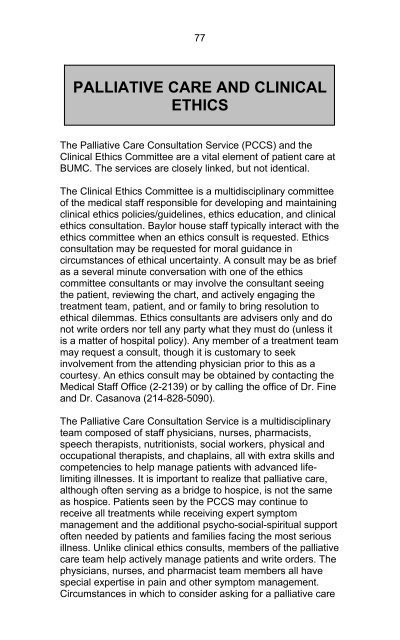BUMC Basics.pdf - Anesthesia Home
BUMC Basics.pdf - Anesthesia Home
BUMC Basics.pdf - Anesthesia Home
You also want an ePaper? Increase the reach of your titles
YUMPU automatically turns print PDFs into web optimized ePapers that Google loves.
77<br />
PALLIATIVE CARE AND CLINICAL<br />
ETHICS<br />
The Palliative Care Consultation Service (PCCS) and the<br />
Clinical Ethics Committee are a vital element of patient care at<br />
<strong>BUMC</strong>. The services are closely linked, but not identical.<br />
The Clinical Ethics Committee is a multidisciplinary committee<br />
of the medical staff responsible for developing and maintaining<br />
clinical ethics policies/guidelines, ethics education, and clinical<br />
ethics consultation. Baylor house staff typically interact with the<br />
ethics committee when an ethics consult is requested. Ethics<br />
consultation may be requested for moral guidance in<br />
circumstances of ethical uncertainty. A consult may be as brief<br />
as a several minute conversation with one of the ethics<br />
committee consultants or may involve the consultant seeing<br />
the patient, reviewing the chart, and actively engaging the<br />
treatment team, patient, and or family to bring resolution to<br />
ethical dilemmas. Ethics consultants are advisers only and do<br />
not write orders nor tell any party what they must do (unless it<br />
is a matter of hospital policy). Any member of a treatment team<br />
may request a consult, though it is customary to seek<br />
involvement from the attending physician prior to this as a<br />
courtesy. An ethics consult may be obtained by contacting the<br />
Medical Staff Office (2-2139) or by calling the office of Dr. Fine<br />
and Dr. Casanova (214-828-5090).<br />
The Palliative Care Consultation Service is a multidisciplinary<br />
team composed of staff physicians, nurses, pharmacists,<br />
speech therapists, nutritionists, social workers, physical and<br />
occupational therapists, and chaplains, all with extra skills and<br />
competencies to help manage patients with advanced lifelimiting<br />
illnesses. It is important to realize that palliative care,<br />
although often serving as a bridge to hospice, is not the same<br />
as hospice. Patients seen by the PCCS may continue to<br />
receive all treatments while receiving expert symptom<br />
management and the additional psycho-social-spiritual support<br />
often needed by patients and families facing the most serious<br />
illness. Unlike clinical ethics consults, members of the palliative<br />
care team help actively manage patients and write orders. The<br />
physicians, nurses, and pharmacist team members all have<br />
special expertise in pain and other symptom management.<br />
Circumstances in which to consider asking for a palliative care




